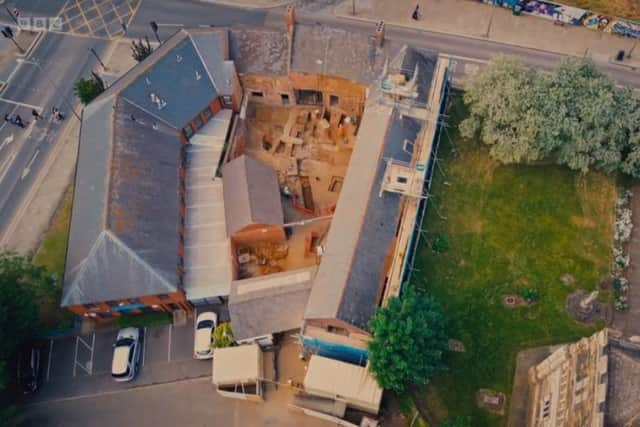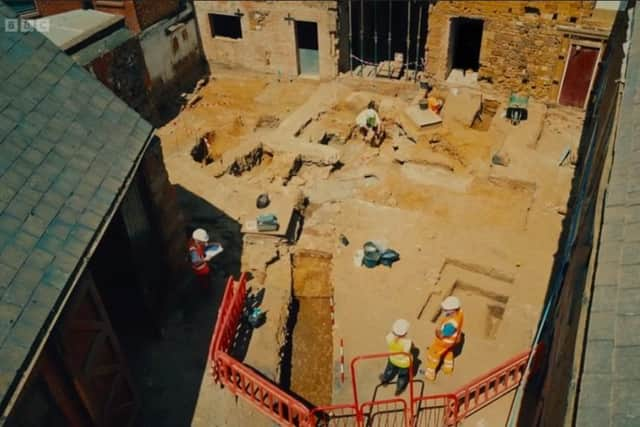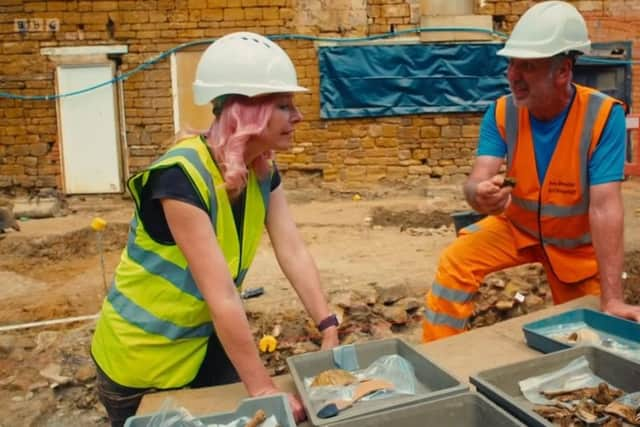Centuries of history unearthed at historical pub in Northampton revealed on BBC's 'Digging For Britain'
and live on Freeview channel 276
The Old Black Lion pub in Northampton was featured on BBC’s Digging For Britain on Tuesday (January 2), revealing fascinating finds and history.
The pub called last orders in 2018, and now a £3 million conservation project is restoring the Grade II listed building to its former glory. This means archaeologists are getting the unique opportunity to see beneath the standing remains.
Advertisement
Hide AdAdvertisement
Hide AdDigging for Britain presenter Alice Roberts introduced the segment, saying: “There were settlements on the banks of the River Nene going right back to the Neolithic. By the medieval period, Northampton had developed into an important town, though wracked by wars and plague. In 1675, the Great Fire of Northampton blazed through the town, destroying most of the timber-framed buildings. The town was rebuilt, but much of medieval Northampton had been wiped out.


“The archaeology here in Northampton is very complicated; it's a palimpsest — layers upon layers through the centuries. There are some places where you can come and see the past, like here with this beautiful Norman Church of St. Peter's. In fact, there's archaeology all around here. And now, archaeologists are getting an opportunity to investigate here, where a pub is being renovated — a pub with a very long history.”
Derek Roberts and his team from Pre Developed Archaeology are spearheading the excavation.
Derek said: “We're here on the behest of the church's Conservation Trust, who have leased the property to turn it back into a pub. It was a pub originally, first documented, I think, around 1720.”
Advertisement
Hide AdAdvertisement
Hide AdAlice and Derek, sitting inside the archaeological trench at the pub, delved further into the footprint of the original coaching inn.


Alice said: “By the 18th century, coaching inns became a staple along Britain's roads, with travellers arriving by horse-drawn carriage stopping off for food, beer, and lodgings. Many of these inns are still in use today as pubs.”
Derek added: "If you look at these places, they're pretty standard. So you'd want to be able to come in, turn your carts around, horses go to the stables, they're fed and watered, and so are the people coming in."
Maps from the early 17th-century mapmaker John Speed provide additional insights, uncovering evidence of even earlier activity.
Advertisement
Hide AdAdvertisement
Hide AdAlice said: “This early map gives only a vague hint that there was something here, right next to the church and at the entrance to the town, predating the 1720 inn, and the team are uncovering evidence of even earlier activity.”


Derek responded: “We have a horseshoe-shaped possible bread oven. You can see the bricks around the outside there. They're really burned out really heavily. I think this may be from a commercial enterprise. Industry? I don’t think so but definitely commercial.”
The team has also found medieval pottery on the site, suggesting the site has been in use for nearly 1,000 years.
Alice said: “The medieval pottery, going back as early as the 12th century, shows us that this site has been in use for nearly 1,000 years, perhaps as a bakery first before it became an inn just inside the gate of the town.
Advertisement
Hide AdAdvertisement
Hide Ad“And then this is going to be made back into a pub again. So it's going to be restored to that function.”
Derek replied: “That's right...they're gonna feed and water the people that are passing by, again.”
Concluding, Alice said: “What I really love about this site is the way that the archaeology under the ground ties in with what still exists above ground, and you're still going to be able to see that, so it's not going to be covered with render and plaster. You'll be able to go to this pub and see that beautiful stonework on show. And once again, it will be going back to its former glory. As an inn.”
